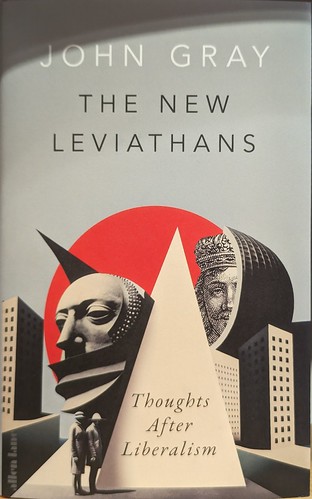
My title isn't really related to this post in any clear way; Google recently reminded me of this photo that I took in Amiens in 2020 on the way back
from the Ecrins; I didn't make much of it
at the time, but appreciated it more in arrears. My title is from a little quote
visible at the bottom and is from
Thérèse of Lisieux. I doubt I'd have got on with her, but the words are lovely. The pix I show here has been cut and de-trapezoided by Googly magic; t
he original is here. It's only a humble Pixel3 though.
No, my post begins with Descartes; for some reason I feel the need to rant about this poor long dead chap. But really he is just an examplar; what I'm really ranting about is philosophy, and the lamentable state of philosophical scholarship.
But first a brief interjection: the other thing I'd rant about, if I could be bothered to, would be the vast torrent of crap that pours upon us. So many people writing some many books, papers, and articles because their voices are important, at least to them. And so many people consuming this torrent of drivel because our glorious free-market capitalism has delivered to them so much free time that they don't know how to use. I am minded of the quote about Hobbes from
a previous post, which I'll repeat here:
He had read much, if one considers his long life; but his contemplation was much more than his reading. He was wont to say that if he had read as much as other men, he should have known no more than other men.
So ignoring my own injunction: browsing a not-very-slim-tome (second hand, Heffers) on
The Rise of Modern Philosophy I come to the chapter on Descartes, which is long on his virtues, and padded with the irrelevant stuff about him being in the wars, but very short on what he actually contributed. It includes the
Cogito, of course; although that in itself contributes little; but like everyone else doesn't mention at all how badly it all breaks down after that; you may read
my fine analysis here. The
Cambridge Companion to Descartes is somewhat better, but that only leads me to his anti-atomism. As
Stanford puts it,
Descartes rejects any form of atomism, which is the view that there exists a smallest indivisible particle of matter. Rather, he holds that since any given spatially extended length is divisible in thought, thus God has the power to actually divide it . In fact Stanford somwhat errs in reproducing his not-desperately clear thought, to the degree that we could blame God for his errors; what he actually says is something like things can't be indivisible, but even if they were, God could make them divisible if he felt like it; see
here,
here)
4.
And that anti-atonism on the part of big D leads me to my startlingly original and definitely worth troubling the world with take on antient Greek physics, specifically that of Aristotle (see-also my not very original notes below). Which is: none of it matters to them, which is why it is all so badly wrong. One can go through identifying errors but that's all beside the point: the unifying principle is that their tech level was so low, they were too far away from it making any difference. Was the world continuous or atomic? They didn't know, and it didn't matter. They couldn't even observe Brownian motion. The penalty for guessing wrong was zero. The penalty for writing down a stream of words that appeared to be a logical argument, and which generations of philosophers were unable to correctly identify as drivel, was zero. It turns out that getting the right answer is hard, and so if you just randomly guess you'll continuously be wrong. See-also: science is grounded in experiment, which
I forgot.
Returning to my picture: at some point I'm going to make a list of all the places I want to go to in France, and then go to them. Or alternatively just go to all the places in France. I should certainly visit all the cathedrals; I've made a fair stab but there are a lot left.
Aristotle's Physics
[I wrote this, but was never really happy with it, which is why I didn't publish it. But now is its time and place.]
If you want to read people being nice about A you will find no shortage out there
1; so I feel no urge to join them. TL;DR
The historian of philosophy, accordingly, must study them, in spite of the fact that hardly a sentence in either can be accepted in the light of modern science (that
nice Bertrand Russell). But more that this, as I hope to show, it doesn't even make sense on its own terms. None of this is relevant to the problem of people being mislead by Aristotle for so many years; that was strictly their own fault, their own stupid reverence for authority and inability to think for themselves; Aristotle left any number of clues that his stuff was blatantly wrong.
There is quite a lot of words in the Physics. In a way, that's surprising: my mental image of those days is that paper3 wss in short supply, so you'd expect authors to have thought carefully before writing and to have compressed their work. Instead, A does the reverse: is discoursive and repetitive and doesn't follow a clear sequence. In this - as with the Politics - one gets the impression of a poorly edited collection of lecture notes. What it doesn't read like is ideas that have survived testing by rigourous dialectic.
Perhaps the greatest virtue of the work is as an example: that something that has survived for a long time can still be completely wrong, and yet still be defended. Consider what other ideas we see in the world today are similar. Of course, part of the problem is that anyone inclined to study this stuff deeply is going to be in sympathy with the material; no-one is going to waste much time ripping it to shreds. So why - I hear you ask - am I bothering? Well I've had these volumes on my shelves for many years now, and the time has finally come to finish reading and dispose of them.
Like say Hippolytus or Iphigenia in Tauris this comes into the "it lasted 2,000 years so there must be something worth while in it" but unlike them it is not literature; and it has not fared well. In the following I shall assume that the (English) words I'm reading have captured the original meaning of the text, despite the gulf that separates us; given the contortions that his translators and interpreters have gone through, I think it likely that I'm getting his best shot, or perhaps better than.
A discusses, let us say, motion. And he is smart enough to try to abstract; he is not interested in the motion of any individual ox-cart. Unfortunately, he abstracts all the way to abstraction; which I can best explain by comparing to, say, Galileo's experiments with rolling spheres down inclined planes. That abstracted to a concrete reality, and so was able to learn something, by observing how very simple entities behave. A abstracts out everything but movers and moving, and so is unable to learn anything.
A is interested in both the real world - or at least, in an abstract version thereof - and in the world of mathematics. Unfortunately he rarely distinguishes the two, or says which any given discussion appertains to; so much so that I doubt he has the distinction clearly in his mind. He is, however, aware that there is a distinction2.
In trying to think about how to Do Physics, A starts well Hence, in advancing to that which is intrinsically more luminous and by its nature accessible to deeper knowledge, we must needs start from what is more immediately within our cognition, though in its own nature less fully accessible to understanding. Now the things most obvious and immediately cognizable by us are concrete and particular, rather than abstract and general; whereas elements and principles are only accessible to us afterwards, as derived from the concrete data when we have analysed them. So we must advance from the concrete whole to the several constituents which it embraces; had he stuck to this, he would have fared much better. That's book I chapter I; chapter II starts off wondering how many "principle"s or "primary constituents" there are; attempting to translate this into ModernSpeak, it seems likely that he is wondering how many elements there are (rather than fundamental particles or states of matter) but - characteristically - his discussion is so unanchored by reality that one cannot really tell; he is already lost, and doesn't know it. He deduces that there must be either one, or finitely many, or infinitely many; after that he bogs down; then chapter VI concludes It is clear, then, that there must be more than one element or principle, and that there cannot be more than two or three. But, within these limits, the decision as between two and three presents great difficulties. This is based on "logic" along the lines of we need a pair of antithetical qualities; and (for the third, if needed) they need something to act on. So alas despite his declared intent to start with reality he falls at the first hurdle, and is reduced to being either Wrong, or perhaps Not Even Wrong. To the obvious rebuttal (which will come up time and again) "but in those early days it was really hard to know anything" comes the obvious answer: yes, it was. And so A, if honest, would have concluded that he simply didn't know and couldn't say anything useful on the topic. To some extent, supported by the end of book I, I believe that A was in this section merely surveying other opinions of the time, or felt himself unable to avoid opining. And sadly book II chapter I begins by stating that the elementary substances are earth, fire, air and water; see previous comments re badly edited lecture notes. Nothing else of interest appears in book II. I should perhaps note that there's quite a lot of stuff that my eyes just slide off... all the verbiage about causes for example; he does love classifying things, even if he has to make them up to do so.
Book III begins by defining motion; I took the piss out of that some years ago and don't feel much more merciful now. His problem is not realising that some things are better left undefined, as Newton did with time; we all know what it is (errm) so wrapping a pile of complicated words around a simple idea doesn't help; see-also Popper. That said, he is also covering too broad a scope; had he restricted himself to physical motion of inanimate objects he might have got along better.
Chapter IV begins to talk about infinity; but in the context of Nature (and thus, implicitly, not Maths).
[I'm fairly sure I intended to write more, but realised that it was all drivel anyway, and badly organised at that. I did Aristotle and the continuum before.]
Refs
* Paul Graham: how to do philosophy.
* Russell on Aristotle's Politics.
* McTaggart on Time.
* My Left Kidney - ACX.
* The sleepwalkers.
Notes
1. Although to be fair, generally not about his Physics. The sort of defensive thing you can expect supporters to say about the Physics is along the lines of What, then, are we to expect from the Physics ? Something that is still of philosophical interest; very much that is of historic interest and that has entered deeply into the texture of our language; much of purely intellectual interest and bracing gymnastic; but also much that is of vital significance in relation to that borderland between physical and metaphysical thought where mathematics and philosophy meet, which I quote from the Loeb intro. Notice that they cannot even begin to mention that so much of it is wrong.
2. From book II chapter II: we have next to consider how the mathematician differs from the physicist or natural philosopher; for natural bodies have surfaces and occupy spaces, have lengths and present points, all which are subjects of mathe matical study. And then there is the connected question whether astronomy is a separate science from physics or only a special branch of it; for if the student of Nature is concerned to know what the sun and moon are, it were strange if he could avoid inquiry into their essential properties; especially as we find that writers on Nature have, as a fact, discoursed on the shape of the moon and sun and raised the question whether the earth, or the cosmos, is spherical or otherwise. Physicists, astronomers, and mathematicians, then, all have to deal with lines, figures and the rest. But the mathematician is not concerned with these concepts qua boundaries of natural bodies, nor with their properties as manifested in such bodies. Therefore he abstracts them from physical conditions; for they are capable of being considered in the mind in separation from the motions of the bodies to which they pertain, and such abstraction does not affect the validity of the reasoning or lead to any false conclusions.
3. Or equivalent.
4. Descartes is lead to this error by his idea that the "essential" property of a given object is its extension in space, which causes him to think in these terms; presumably, an indivisible object would have a property-in-itself that wouldn't fit into his schema. In turn this leads him to fail to get to momentum, despite some promising thoughts in that area. But analysing his errors individually isn't really interesting; my point rather is that there are endless ways of going wrong; you will always fall off the knife-edge of truth, unless you have something - in the case of physics, reality - to correct you.
 "The exception proves the rule" is a well-known phrase with more than one meaning; the one I take uses "prove" in the sense of "test". In maths or science of software this makes sense: edge and corner cases are useful: my software must work given any legal but unlikely input, and must fail in defined ways if given illegal input.
"The exception proves the rule" is a well-known phrase with more than one meaning; the one I take uses "prove" in the sense of "test". In maths or science of software this makes sense: edge and corner cases are useful: my software must work given any legal but unlikely input, and must fail in defined ways if given illegal input.


